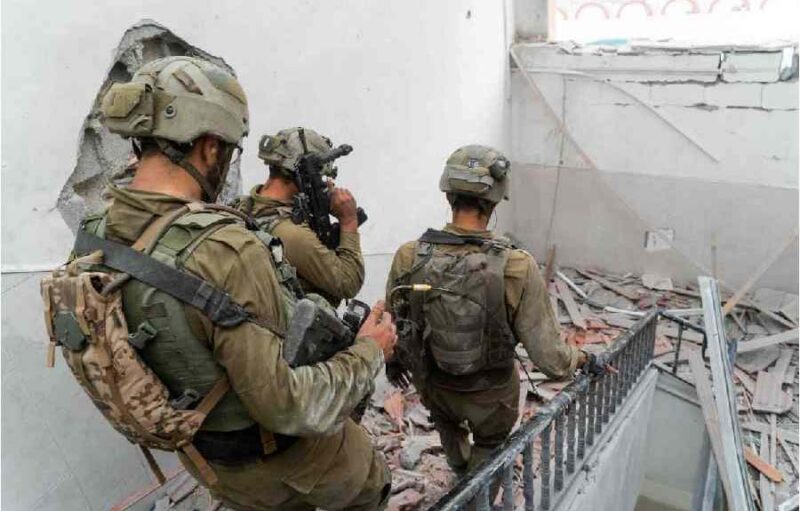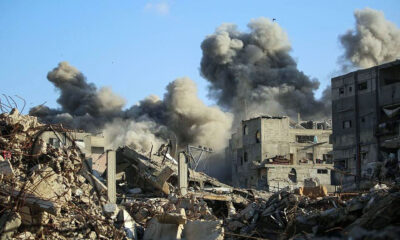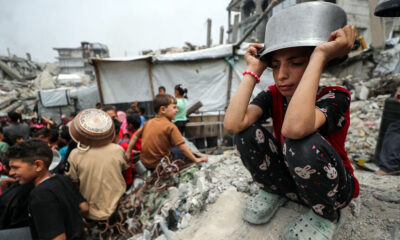International
Israel/Hamas war: First hostages from Gaza to be released Friday

Israel/Hamas war: First hostages from Gaza to be released Friday
The start of a four-day truce agreement between Israel and Hamas that was supposed to take effect after nearly seven weeks of fighting is already being hampered by delays.
The agreement aims to release hundreds of hostages and allow aid into Gaza.
The actual start time of the truce, which was supposed to start on Thursday at 10 am (0800 GMT), remained unknown since Israel had not yet announced when it will stop its ground and air offensive in the coastal region.
According to an Israeli army spokesman, the procedure for bringing hostages back to Israel from the Gaza Strip is intricate and not yet finalized.
Daniel Hagari stated late on Wednesday that the military was getting ready to carry out this first part of the hostage exchange agreement.
However, the repatriation of the people abducted to the sealed-off coastal strip could take time and take place in several stages, he said.
“The release (of hostages) will begin according to the original agreement between the parties, and not before Friday,” Israel’s security adviser Tzachi Hanegbi was quoted by newspapers Haaretz and the Times of Israel and the N12 channel as saying.
“The talks on the release of our hostages are progressing and will continue on an ongoing basis.”
The first exchange of hostages kidnapped in Israel for Palestinian prisoners was initially expected to take place on Thursday.
The Times of Israel cited an Israeli official as explaining the delay by saying that both Israel and Hamas would have to sign a document ratifying the agreement for it to come into force.
READ ALSO:
- NASS member sets to marry off 100 female orphans in Kebbi
- First Lady launches market-moni expansion, aids 1.5 million Nigerians
- Unqualified graduates will not participate in NYSC — DG
Haaretz reported that Israeli officials had said there would be no halt to the fighting as long as there is no finalized timeline for the agreement with Hamas.
The agreement foresees 100 hostages being released from Gaza in exchange for 300 Palestinian prisoners held in Israel.
The Israeli Cabinet signed off on the deal early Wednesday after weeks of fraught negotiations mediated by Qatar and the United States.
The deal’s first step involves the release in stages of 50 Israeli women and children that have been held by militants in Gaza since the Oct 7 terrorist attack. In exchange, 150 Palestinian prisoners are to be released.
In a second step, up to 50 further Israeli hostages are also to be exchanged in small groups for up to 150 further Palestinian prisoners.
The ceasefire is to be accompanied by larger aid deliveries for the suffering civilian population in the Gaza Strip, where food, water, electricity, and medical supplies are running scarce.
Israel said the ceasefire will last at least four days but could be extended by one day for every additional 10 hostages released.
A maximum of 10 days is planned for the entire exchange.
After that, the Israeli army’s fight against Hamas and other Islamist extremists in the Gaza Strip is to continue.
Terrorists from Hamas and other Palestinian militant groups carried out unprecedented massacres in southern Israel on Oct. 7, killing around 1,200 people and taking around 240 people hostage.
Of the 240 people who were kidnapped and taken to Gaza, four women have so far been released by Hamas.
One young soldier was rescued by the Israeli military.
READ ALSO:
- Tougher days ahead as naira crashes further against dollar
- Appeal court sacks Ogun PDP lawmaker, declares APC winner
- Kano gov: Confusion as A’Court certified judgement document affirms Yusuf victory
The army also found the bodies of two people.
It is unclear how many hostages are still alive.
Local media reported Israel will pass on a first list of names of hostages to be released.
Kidnapped mothers and children were not to be separated.
The Israeli government on Wednesday announced the names and details of the 300 imprisoned Palestinians who are eligible for release from prison.
On list are 123 people under the age of 18, with the youngest being 14.
According to the list, 33 prisoners are girls and women.
They are accused of throwing firebombs, arson, and knife attacks, among other offences.
No prisoners serving time for murder are set for release.
Once free, they are to return to the places where they lived before their imprisonment, such as the West Bank or East Jerusalem.
Shortly after the Oct. 7 attack Israel’s military launched airstrikes on the Gaza Strip and deployed ground troops with the aim of destroying Hamas.
According to the Hamas-controlled Ministry of Health, more than 16,000 people have been killed so far.
The Israeli army said on Wednesday that soldiers have destroyed around 400 tunnel shafts since the start of the war.
Many of the tunnels used by Hamas were found under civilian hospitals, schools, and houses.
The Palestinian Red Crescent said more patients are to be evacuated from the ruined al-Shifa Hospital in Gaza City.
Fourteen ambulances, accompanied by staff from the UN and Doctors Without Borders, arrived at the Gaza Strip’s biggest hospital on Wednesday.
Patients were to be taken to hospitals in the south, where conditions are relatively safer than in the north.
Israel/Hamas war: First hostages from Gaza to be released Friday
International
Trump Imposes 15% Global Tariff Hours After Supreme Court Blocks Previous Tariffs

Trump Imposes 15% Global Tariff Hours After Supreme Court Blocks Previous Tariffs
President Donald Trump has announced a 15 % global tariff on imported goods just hours after the U.S. Supreme Court struck down his earlier tariff programme as unconstitutional. The decision marks a major escalation in U.S. trade policy and signals potential disruptions for global markets.
The Supreme Court, in a 6‑3 ruling, found that Trump overstepped his authority by using emergency powers under the International Emergency Economic Powers Act (IEEPA) to impose sweeping tariffs. The Court ruled that only Congress has the power to levy broad import taxes, effectively invalidating the president’s previous tariffs on most trading partners.
In response, Trump moved swiftly to raise tariffs under Section 122 of the Trade Act of 1974, which allows temporary import duties of up to 15 % for 150 days without congressional approval. Trump described the increase as “fully allowed and legally tested” and indicated his administration will explore additional legally permissible tariffs in the coming months.
READ ALSO:
- APC Wins Rivers Ahoada East State Constituency II Bye‑Election
- Opposition Weakens as Another Governor Eyes APC Move
- ₦13.7bn Payroll Fraud Claim Pits Audit Firm Against Osun Government
Official statements confirmed that the new tariff takes immediate effect, covering imports from all countries. The White House framed the move as a measure to protect U.S. workers and industries from unfair foreign competition, even as analysts warn it could increase costs for consumers and invite retaliatory trade measures from other nations.
Economic and Political Reactions
The Supreme Court decision and Trump’s rapid tariff escalation drew mixed reactions. Business groups and economists cautioned that higher tariffs could disrupt supply chains, increase inflation, and slow economic growth. Some companies have already filed legal claims seeking refunds for previously collected tariffs.
Meanwhile, global trading partners are monitoring the situation closely, warning that the 15 % tariff could strain diplomatic and trade relations. Supporters of Trump’s trade stance argue that tougher tariffs are necessary to address U.S. trade deficits and protect domestic manufacturing.
Section 122 authority expires after 150 days unless Congress extends it, meaning the long-term enforcement of the 15 % tariff may require legislative backing. Analysts say the move highlights the tension between executive authority, judicial oversight, and congressional power in U.S. economic policymaking.
Global Implications
Markets around the world have reacted cautiously to the announcement. Some trading partners may implement retaliatory tariffs, while global supply chains could face disruptions, particularly in consumer electronics, automotive, and industrial sectors. Analysts predict that ongoing uncertainty will affect trade flows and investment decisions in the short term.
Trump’s announcement comes at a politically charged moment, with midterm elections and international trade negotiations influencing domestic and global economic strategies. The move underscores the complex interplay of law, politics, and economics in U.S. trade policy.
Trump Imposes 15% Global Tariff Hours After Supreme Court Blocks Previous Tariffs
International
UK Court Hands Life Sentence to Nigerian Teen for Knife Attack Killing

UK Court Hands Life Sentence to Nigerian Teen for Knife Attack Killing
A Nigerian teenager residing in the UK, Jackson Uwagboe, has been sentenced to life imprisonment for the murder of 21-year-old Robert Robinson, following a brutal knife attack in Lewisham, London. The sentencing was delivered at the Old Bailey on Wednesday.
The Metropolitan Police confirmed that 19-year-old Uwagboe of Hamilton Street, Lewisham, was found guilty of murder on Tuesday, 10 February 2026, in a case stemming from a dispute over a stolen bicycle. The court ruled that Uwagboe must serve a minimum of 21 years before he can be considered for parole.
Uwagboe’s co-defendant, Eromosele Omoluogbe, 24, was earlier convicted of perverting the course of justice after assisting Uwagboe in attempting to flee to Nigeria via Heathrow Airport.
READ ALSO:
- Ogun Gov Rewards Nigeria’s Best Primary School Teacher with Car, Bungalow
- Police Bust Gang Armoury, Arrest Two Suspects in Delta
- Peter Obi Launches ‘Village Boys Movement’ to Rival Tinubu’s City Boys Ahead of 2027
Prior to this sentencing, two other men, Ryan Wedderburn, 18, and Kirk Harris, had already been convicted and handed life sentences in May 2025 for their roles in the same murder.
Detective Inspector Neil Tovey, who led the investigation, described the incident as a “brutal and sustained attack”. He said, “Robert was subjected to a brutal and sustained attack by a group of men armed with knives. He was unarmed, already wounded, and on the ground when Uwagboe attacked him. Today’s verdict brings justice for Robert Robinson and his family.”
The case has drawn attention to youth violence, knife crime, and gang-related activity in London, as well as the challenges faced by law enforcement in preventing violent disputes over seemingly minor disputes such as bicycle theft.
The sentencing underscores the UK judicial system’s approach to serious violent crimes, ensuring that perpetrators face long-term incarceration while providing a clear minimum term before parole consideration.
UK Court Hands Life Sentence to Nigerian Teen for Knife Attack Killing
International
UK-Based Nigerian Gets 13-Year Jail Term for Forcing Girlfriend to Abort Pregnancy

UK-Based Nigerian Gets 13-Year Jail Term for Forcing Girlfriend to Abort Pregnancy
A UK-based Nigerian man, Adeleke Adelani, has been sentenced to more than 13 years’ imprisonment for unlawfully aborting the pregnancy of his former partner after coercing her to take abortion medication on Valentine’s Day.
The offence occurred in 2020 when Adelani, then 28 years old, deceptively invited the woman — whose identity is legally protected — to his residence in Letterkenny under the guise of discussing the future of her pregnancy. Evidence before the court showed that the victim was nine weeks pregnant at the time of the incident.
Prosecutors told the court that upon her arrival, Adelani threatened the woman with violence and forced her to ingest five tablets of misoprostol, a drug used for medical abortions, thereby causing the unlawful termination of the pregnancy. The court heard that the defendant had researched the medication in advance and acted deliberately. The victim later contacted authorities, leading to Adelani’s arrest by Irish police.
READ ALSO:
- Lawmaker Jailed for Mocking President in Facebook Post
- Police to Arrest TikToker Mirabel After She Recants False Rape Claim
- Tinubu Reduces Reliance on U.S, Strengthens Defence Partnerships With Turkey, EU
At the time of the sentencing, Adelani was already serving a separate seven-year prison sentence for an unrelated offence. He had initially been due to stand trial last year but pleaded guilty before jury selection began, accepting responsibility for the charges brought against him.
During the sentencing hearing at the Letterkenny Circuit Court, the victim delivered a powerful impact statement, explaining that although she had chosen to forgive Adelani, the consequences of his actions would remain with her for life.
“I have forgiven the defendant,” she told the court. “That forgiveness does not mean what he did was acceptable. It means I refuse to let what he did continue to control my heart and my life. When he wrongfully imprisoned me and caused the termination of my nine-week pregnancy, he took far more than my freedom. He took my child. He took my sense of safety. He took a future that I had already begun to plan and love.”
In a letter read aloud in court, Adelani apologised to the victim, accepted full responsibility for his actions, and expressed remorse for the pain and trauma he caused.
Delivering judgment, John Aylmer described the crime as deliberate, premeditated, and deeply traumatic, stressing that it involved coercion, abuse, and a serious violation of trust. The judge sentenced Adelani to 11 years in prison, with the final two years suspended, for causing the unlawful termination of a pregnancy, and an additional five years, with the last 12 months suspended, for assault causing harm.
The sentences are to run concurrently, adding to Adelani’s existing term and resulting in an overall prison sentence exceeding 13 years. The case has reignited debate in Ireland and internationally about reproductive coercion, domestic abuse, and violence against women, with legal observers describing it as one of the most serious cases of its kind in recent years.
UK-Based Nigerian Gets 13-Year Jail Term for Forcing Girlfriend to Abort Pregnancy
-

 Politics2 days ago
Politics2 days agoPeter Obi Launches ‘Village Boys Movement’ to Rival Tinubu’s City Boys Ahead of 2027
-

 International3 days ago
International3 days agoCanada Opens New Express Entry Draw for Nigerian Workers, Others
-

 News2 days ago
News2 days agoPolice to Arrest TikToker Mirabel After She Recants False Rape Claim
-

 Education17 hours ago
Education17 hours agoUTME: JAMB Clarifies Position on Hijab During Biometric Capture
-

 International2 days ago
International2 days agoEpstein, Ex-Israeli PM Named in Alleged Profiteering From Boko Haram Crisis
-

 metro3 days ago
metro3 days agoOsun Awards 55.6km Iwo–Osogbo–Ibadan Road Project to Three Contractors
-

 Politics3 days ago
Politics3 days agoUpdated: Rivers Senator Mpigi Barinada dies at 64
-

 Education2 days ago
Education2 days agoOgun Gov Rewards Nigeria’s Best Primary School Teacher with Car, Bungalow















